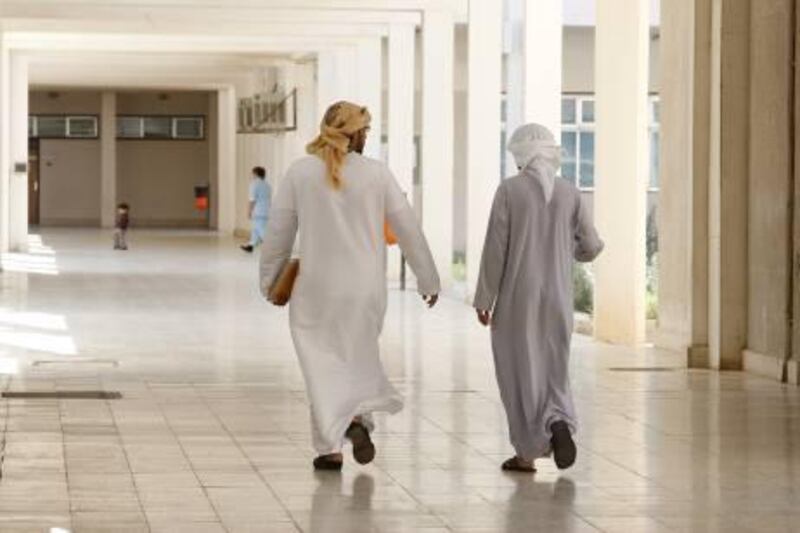AL AIN // Emirati students with psychological problems avoid seeking help because of the stigma attached - and are often unaware that help even exists, according to a study from UAE University.
Dr Fatima Al Darmaki, an associate professor of psychology at the university, spoke to 492 students as part of the research.
She found that while most were positive about the idea of seeking professional help, fewer than half would ever do so themselves, preferring to turn to family members, classmates or friends.
"They have a negative attitude towards personal disclosure, talking about personal issues with a stranger," she said. "They are not easy to discuss, even with a friend, unless you really trust them."
Adding to the stigma, she said, was that having a problem was also seen as a sign of weakness.
The study, based on almost two years of research, was published in the Journal of International Counsellor Education in October.
Like their counterparts worldwide, Emirati students at UAEU have issues and problems, such as career or academic worries, home sickness, or more personal issues, that can affect their academic performance. Most of the problems relate to the transition of moving away from home to university.
"For many it's their first time away from home," Dr Al Darmaki said. "It's the first time they have to make decisions for themselves, with the pressure of doing assignments, managing their time, building social relationships and managing their expectations of their achievements."
For men, their major concern is often their career, as the realisation dawns that they will soon have to support a family.
Women are more concerned about doing well academically, which ties in to their sense of self esteem.
"This is the first time the females have had to make decisions for themselves, like which courses or which major to take," said Dr Al Darmaki. "These gender differences relate to the culture."
Mohammed Al Qemzi, 22, is a business student at the University of Wollongong in Dubai.
Emirati culture is very private, he said, and the stigma attached to seeking help acts as a major barrier to doing so.
He would like to see more awareness of the benefits of seeking professional help.
"It may in some cases be better to turn to someone outside the family though, as it will be a much more unbiased opinion," he said. "Sometimes people just need an outlet to vent and this is very healthy."
For academic advice, he speaks to the university's academic counsellor rather than his parents, simply because he feels they are trained to deal with the issues he raises.
"That's their job," he said.
Dr Al Darmaki said the concept of counselling was very new here, meaning much work has to be done to raise its profile.
One of the challenges is to bring it into the mainstream education system.
There are no master's degrees in the subject as yet, which UAEU is trying to rectify.
Without training local professionals, counselling would remain a minority profession, according to Dr Al Darmaki.
Studies internationally, she said, have shown that many people prefer to turn to someone of the same cultural background as themselves, which is tricky when there are few trained Emirati psychologists.
"It's not enough to have a bachelor's degree," she said. "It's a profession and how will you get more Emiratis into the profession when the courses aren't available?
"It is not only students in university who need help, but what about counsellors in the workplace? People always have problems and who do they turn to?"
Isaac Cherian is a counsellor at the Higher Colleges of Technology in Al Gharbia.
In the past, many did not use the service, thinking it was bad to share problems outside their family, or they feared they would be mocked by their peers if they were seen as weak or in need of help.
Things have changed in recent years, said Mr Cherian.
The issues students have raised were more diverse than before and were no longer limited to academic problems, he added.
"The stigma for seeking help is strong in the community but when they understand - often from their seniors - that the counselling service is similar to a maths class where they try to learn to solve a problem, they are open to availing the services," he said.
As students battle with social change, trying to balance tradition and identity with the changes of modern life, new challenges have arisen, so there has been a greater need to seek help.
"When we are happy we learn better," Mr Cherian said. "Professional counselling services are not common in UAE communities, colleges and universities, but offer a safe setting for such explorations in their early youth."






